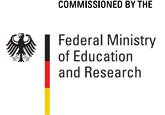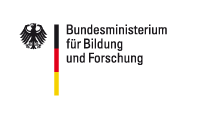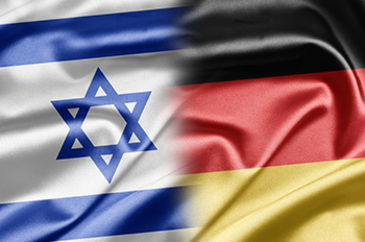- Funding opportunities
- Political framework
- Priorities of the cooperation
- Highlights of the bilateral cooperation
- European Cooperation
Funding opportunities
Current funding opportunities for German-Israeli cooperation in research, innovation and education are set out in the calls section of the cogeril.de website. The wesbite also provides details on further funding advice.
Political framework
The current (as of January 2024) cooperation is heavily influenced by the unstable situation in Israel and the region - it is therefore subject to short-term adjustments.
50 years of German-Israeli science and technology cooperation
In 2023, Israel and Germany are celebrating 50 years of successful science and technology cooperation (STC).
German-Israeli research cooperation between the Federal Ministry of Education and Research (BMBF) and the Israeli Ministry of Innovation, Science and Technology (MOST) is based on an exchange of letters dating from August / September 1973, while the German-Israeli Programme for Cooperation in Vocational Education and Training has existed since 1969.
Pillars of cooperation
In addition to the interministerial research partnership between the BMBF, BMWi, BMU and the Israeli Ministry of Innovation, Science and Technology (MOST), the Israeli Ministry of Economy and Industry ( MOE), several foundations and funding programmes (Minerva, GIF, DIP, Martin-Buber) constitute the second pillar of the cooperation.
The Minerva-Stiftung Gesellschaft für die Forschung mbH was founded in 1963 and marked the start of the scientific cooperation with Israel. In 1973, the interministerial cooperation with MOST commenced, followed by an agreement with the MoE in 2000. All in all, research institutions in the two countries have so far been funded in almost 700 joint projects as part of the specialised programmes of the BMBF and the partner ministries. The German-Israeli Foundation for Scientific Research and Development (GIF) founded in 1986 is another corner stone of the cooperation. The BMBF has funded major transdisciplinary German-Israeli projects in the context of the German-Israeli Project Cooperation (DIP) since 1997. Since 2008, the DIP is managed by the DFG. The Foundation Martin Buber Society of Fellows in the Humanities was established in late 2009.
The BMBF has also supported several multilateral cooperation projects with Israel and its Arab neighbours, primarily in marine research and environmental and water technologies, in order to promote the peace process in the Middle East.
Priorities of the cooperation
Website of the German-Israeli cooperation
The website cogeril.de - 'Cooperation Germany-Israel' provides information about current funding opportunities as well as about the history and structure of German-Israeli science cooperation. This cooperation is unique in that diplomatic relations intensified as a result of the close scientific cooperation. The website enables scientists from both countries to find out more about important topics and current funding opportunities. The research landscapes of the two countries are also presented. In 2023, the website has been overhauled on the occasion of the 50th anniversary of Scientific and Technological Cooperation (STC) between Israel and Germany.
Topics and structure of the cooperation
The priorities of the bilateral cooperation between German and Israeli ministries range from the life sciences (e.g. cancer research) and environmental sciences (e.g. water technologies; marine sciences and geosciences) to key technologies (e.g. civil security, nanotechnologies, battery research, photonics) and humanities / social sciences. Both countries also have been cooperating in vocational training since 1969. In addition, the foundations and major programmes financed by the BMBF - Minerva, German-Israeli Foundation, German-Israeli Project Cooperation (DIP) and the foundation fund Martin-Buber Association - also play a significant role in the cooperation.
The intermediary organisations funded by the BMBF and by other federal ministries (Alexander von Humboldt Foundation, German Academic Exchange Service) as well as private sponsors are also involved in funding the cooperation.
For several years now, the funding of German-Israeli scientific and industrial collaboration projects has focused on application-oriented, industry-related research. In 2011, an intergovernmental agreement was signed regarding the bilateral cooperation in industry-led research and development as well as in vocational training and further education.
Minerva finances research centres at Israeli universities and research institutions, offers an extensive scholarship programme for young scientists and funds projects at the Weizmann Institute of Science (WIS). Between 2008 and 2019 the ARCHES prize for joint research projects was awarded by Minerva.
The GIF funds cutting-edge research in all scientific disciplines with priorities that change every year. In addition, a special programme for young scientists (the Young Scientists Programme, YSP) was launched in 2000. In 2021, the GIF has restructured its funding programmes. The new NEXUS programme is divided into 2 funding lines: a collaborative track for joint proposals by German and Israeli researchers and a solo track for early career scientists. The second GIF Nexus Call was published at the end of 2023.
Israeli universities and the Weizmann Institute can submit suggestions for projects involving German research partners in the context of the DIP excellence programme. The programme is open to all areas with a focus on natural and life sciences.
The Foundation Martin Buber Society of Fellows in the Humanities, Cultural Studies and Social Sciences aims to strengthen interdisciplinary cooperation in these areas. Each year, 10 new scholarships for joint research are awarded at the Hebrew University Jerusalem. Several Minerva centres are dedicated to the humanities and social sciences. As part of the bilateral cooperation, Israel is an important partner in the Käte-Hamburger College and Humanities Centres funded by the BMBF.
Highlights of the bilateral cooperation
Nanotechnology
In February 2016, former State Secretary Thomas Rachel and former Director of the Israeli Ministry of Economics Amit Lang agreed on a programme to fund applied research and technology transfer in nanotechnology.
In this context, Germany and Israel launched a call for proposals for bilateral R&D cooperation in the field of applied nanotechnology in November 2016. Twelve joint projects started at the beginning of 2018. Both countries invested around 8 million euros each in the three-year projects. The mid-term meeting on the bilateral call for proposals took place in Bonn in February 2019, the final (online) conference in November 2021.
Cancer research
The German-Israeli cooperation programme for cancer research started in 1976. It is operated by the DKFZ and funded by the BMBF. So far, about 200 tandem projects have been funded. With the (now up to 10) summer and winter schools, the promotion of young scientists is also carried out in this context. In the course of the COVID-19 pandemic, DKFZ and the Weizmann Institute (WIS) carried out joint research activities. More about the cooperation in cancer research.
Water technology
BMBF and MOST have collaborated in this area since 1974; since 1997 also in a multilateral framework with the participation of research institutions from Germany, Israel, Jordan and the Autonomous Palestinian Territories. The latest status conference of the German-Israeli water technology programme took place in Ashdod, israel, from 25-27 October 2022. You can download the conference proceedings here. The current call was launched at the turn of the year 2023 / 2024. It will be open until 13 March 2024. Germany and Israel are also jointly involved in the multilateral programme 'Middle East Water Research Cooperation Programme (MEWAC)'.
Marine sciences
Since 1977, projects in marine sciences have been funded. A joint action plan has been guiding the cooperation since 2002 ('German-Israeli Cooperation in Marine Sciences and Geosciences').
Battery research
A declaration of intent on collaboration in battery research and electrochemistry was signed by the BMBF and the MoE during intergovernmental consultations in 2012. Since 2014, there has been a joint 'battery school' between Germany and Israel, GIBS (German Israeli Battery School) for young scientists. In September 2016, the joint initiative 'New Materials for Battery Systems – Promoting German-Israeli Research Collaborations' was launched; a second call for proposals was published in 2018. The fifth GIBS workshop took place on 2 March 2023 in Israel.
Funding of young scientists
Many cooperation programmes (e.g. battery research) create the basis for a long-term future cooperation by funding young scientists. The call for applications in water technology runs alongside the 'Young Scientists Exchange Programme' for research visits to the other country. The GIF awards scholarships annually as part of its young scientist programme.
From 2020 to 2023, the BMBF is also funding a trilateral doctoral college for Israeli, Palestinian and German students, the Wasatia Graduate School for peace and conflict reolution at the University of Flensburg, with around 150,000 euros.
The BMBF offers the winners of the Israeli Young Scientists competition – comparable to the German 'Jugend forscht' – a three-week stay at the International Science Camp (ISC) in Göttingen.
In 2023, a German-Israeli Quantum Future Academy for students of STEM subjects also took place, with two events, one in Germany and one in Israel.
Vocational training
Germany and Israel have cooperated in the area of vocational training since 1969. In 2011, the cooperation intensified due to an agreement between the BMBF and the Israeli Ministry of Economics. In 2013, the BMBF commissioned the National Agency of Education for Europe at the Federal Institute for Vocational Training (NA-BIBB) to implement the Israel Programme. The core elements are trainee exchange, expert exchange through mutual study tours, and joint teams of experts.
European Cooperation
Since 1996, Israel has been an associate partner in the European Framework Programmes (FP). The strong involvement of Israeli researchers in cooperation projects highlights the importance of the European cooperation for the Israeli research system. As part of FP7, Israeli partners were involved in 1621 cooperations. The priorities were ICT, life sciences and nanotechnology. In addition, Israel was strongly committed to setting up research infrastructures as part of FP7. Israeli partners were also involved in European network projects (ERA-NETs, INCO-NETs). At least one German partner was involved in each of the 679 FP7 projects with Israeli participation. Germany was Israel’s most frequent partner in these cooperation projects.
On 8 June 2014 Israel signed the association agreement to Horizon 2020 , the EU's 8th Framework Programme. A total of 564 institutions from Israel participated in 1,629 Horizon 2020 projects. Israel's closest cooperation partner in Horizon 2020 was Germany, as in the previous programme, followed by Spain in second and Italy in third place. German and Israeli institutions cooperated in a total of 603 projects, i.e. German institutions participated in around 37% of all projects with Israeli participation.
On 6 December 2021, Israel became an Associated Country to Horizon Europe, the EU's 9th Framework Programme for Research and Innovation. Therefore, Israeli researchers and institutions can participate in the programme under the same conditions as those from EU Member States. By September 2023, 146 Israeli institutions were involved in 448 Horizon Europe projects. German and Israeli institutions have cooperated in 172 projects in Horizon Europe to date. This means that German institutions are also represented in around 38% of all projects with Israeli participation.
Israel is a full member of EUREKA, the European network for industrial market-oriented research. In addition to bilateral agreements, EUREKA offers additional opportunities for technological cooperation between Israeli and German companies and research institutions. Israel participates in approx. one quarter of all current EUREKA projects. Israel is also involved in Eurostars, a programme for SMEs that drive research, which was jointly launched by EUREKA and the European Commission in 2008. In addition, the country is a cooperating partner in the European Cooperation in the Field of Scientific and Technical Research (COST).
PRIMA (Partnership for Research and Innovation in the Mediterranean Area) is an Article 185 initiative. The aim of PRIMA is to develop joint innovative solutions for water management and supply as well as for agri-food systems in the Mediterranean, in order to make them more climate-resilient, cost efficient and sustainable. A total of 19 countries (including Germany and Israel) in Europe and the Southern and Eastern Mediterranean and the European Commission participate in PRIMA. The PRIMA Calls 2024 are expected to be published in the first quarter of the year. A national info event on the current round of calls will be held online and in German language on 31 January 2024.










